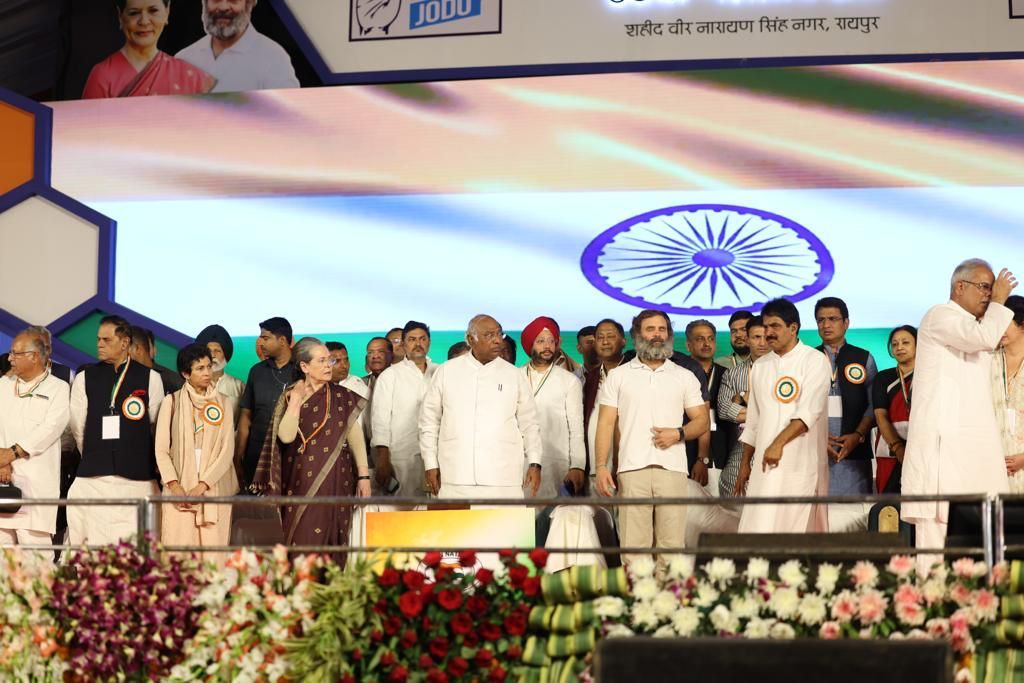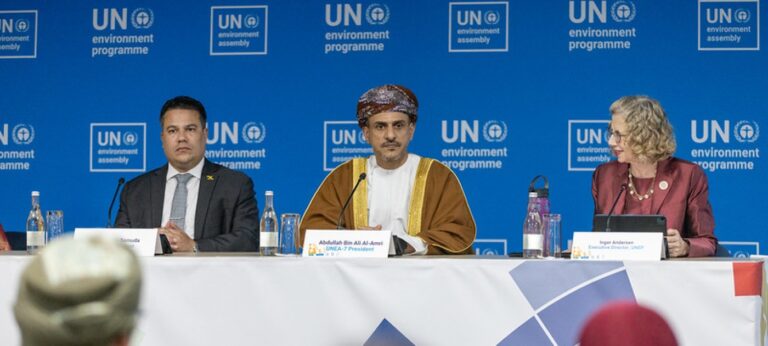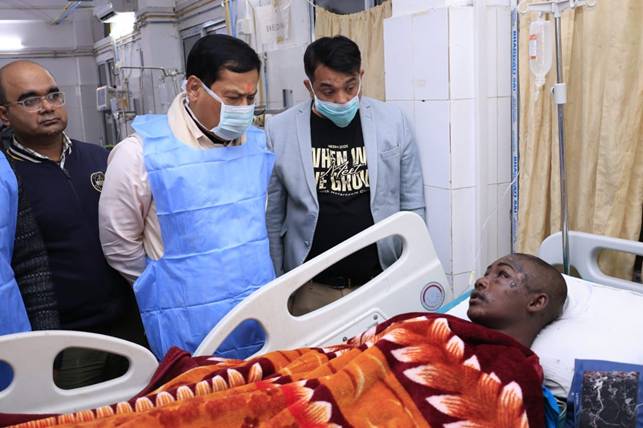
Congress leaders in Raipur
 By G Krishna Mohan Rao*
By G Krishna Mohan Rao*
Raipur: The three-day All India Congress Committee’s (AICC) 85th plenary session today indirectly, acknowledged the Bharatiya Janata Party’s present poll position by observing a third front, as propagated by Telangana Chief Minister and Bharat Rashtra Samithi chief K Chandrasekhar Rao as well as Delhi Chief Minister and Aam Aadmi Party chief Arvind Kejriwal, will benefit the BJP-led National Democratic Alliance (NDA).
The issue of “opposition unity” was very much part of the five-point “Raipur call to action”, and the AICC sent out a clear message that there is no longer any confusion about its approach to forming alliances in the run-up to the 2024 Lok Sabha elections.
The plenary session concluded here today and the AICC, in its “call to action”, said, “we are prepared to work with like-minded parties on the basis of a common, constructive programme to preserve and protect the Constitution in letter and spirit, and to address the three main challenges facing the country: growing economic inequality, intensifying social polarisation and deepening political dictatorship”.
Congress General Secretary Priyanka Gandhi Vadra also batted for the opposition unity with only one year left for polls. “There is an expectation that we should unite. There are expectations from all parties, but the maximum expectation is from Congress,” she said.
The Raipur declaration focused on the busy election schedule ahead which will see the polls in Karnataka, Telangana, Chhattisgarh, Rajasthan, Madhya Pradesh and Mizoram. It was felt that the outcomes here will deeply influence the Congress Party’s bargaining power. Even “like-minded” political parties may not be accommodating if the Congress does not rise to the occasion to perform better in assembly polls. Unless the 2023 assembly polls show that the Congress is the party that can defeat the BJP, it would be difficult to get into alliances for the 2024 general elections.
The Congress Party appears to have moved strategically by placing its readiness to partner with ideological allies right at the head of the crisp vision document crystallising three days of discussion involving 15,00 delegates and Congress leadership. It aimed to set the optics right with its support base, after the Janata Dal-United leader and Bihar Chief Minister Nitish Kumar’s repeated public statements created an impression that the Congress was either unwilling to, or lacked urgency in, resurrecting the anti-BJP axis, thereby casting it as the spoiler in the fight against the communal forces.
The plenary also sent a message that the Congress was the “only party that has never compromised with BJP/Rashtriya Swayamsevak Sangh and its “despicable politics”, and said that it will continue to confront the “BJP’s authoritarian, communal and crony capitalist onslaught”.
The Congress Party also demanded a caste census in the country, a Universal Right to Health Act, and a women-centric NYAY programme.
The session took note that regional parties, particularly in the south and east India, are often the dominant political force in states. Moreover, no political party will voluntarily cede space. Plus alliances at the national level are sometimes formed after the election. Regional parties tend to be flexible when it comes to post-poll alignments as protecting their state’s interest and party’s interest takes precedence over political ideologies. Therefore, looking for ideological affinity may not yield much.
The party’s communications chief Jairam Ramesh confirmed that another Yatra by party leader Rahul Gandhi, whose form and contours are under discussion, from East to West, was on the cards. This Yatra will be different from the Bharat Jodo Yatra in format and size as critical elections are coming up in Karnataka, Telangana, Madhya Pradesh, Rajasthan, Chhattisgarh and Mizoram.
The plenary resolved to maximise the goodwill created by the Bharat Jodo Yatra with continued mass contact programmes to expose “ crude crony capitalism “ and “communal politics “ of the Narendra Modi government. The three-day session also demolished any misgivings about Rahul Gandhi’s leadership despite Mallikarjun Kharge’s presence at the helm, besides showcasing perfect harmony between the new arrangement and the Nehru-Gandhi family. While on the economic front, the plenary deepened the Congress Party’s commitment to the welfare state, there was a dramatic shift towards social justice on the organisational front.
*Senior journalist





